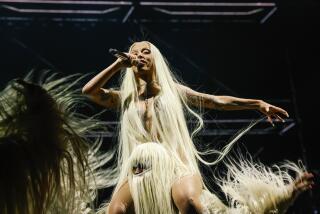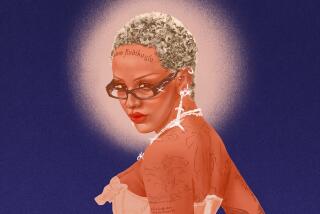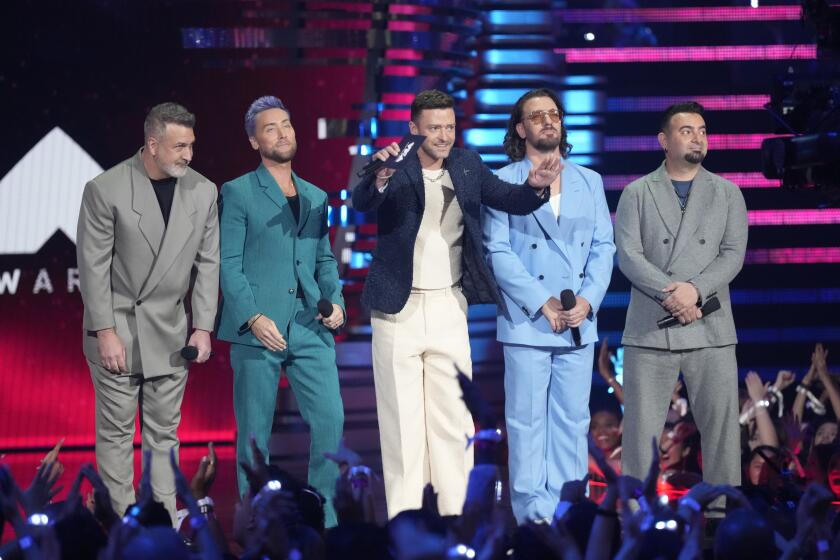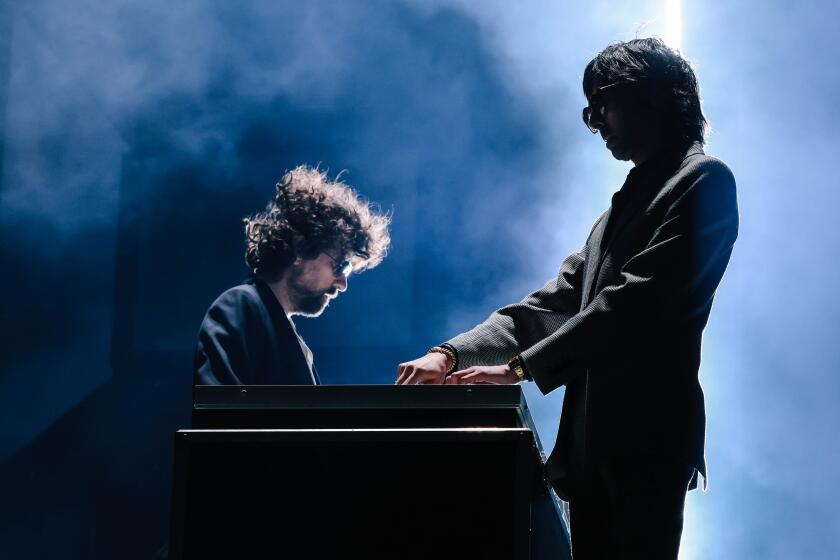Amid the #MeToo and Time’s Up movements, Girlschool’s female-identifying music festival has new resolve
In the ’90s, when Garbage frontwoman Shirley Manson was approached to perform at Lilith Fair — the traveling music festival featuring an all-female lineup with the likes of Sheryl Crow, Fiona Apple and Tracy Chapman — she said no.
“I didn’t want to participate because I felt like it was ghetto-izing women,” she said. “I wanted to play in the big pond, not the little pond.”
Now that Manson, 51, is older, her attitude has changed. She’s become a regular at L.A.’s own all-female-identifying festival Girlschool LA, returning to headline this weekend’s third annual event at the Bootleg Theater. In the post-Weinstein landscape, Girlschool’s dedication to providing a safe space for women feels more crucial than ever.
The three-day event, which begins Friday, comes just days after the Grammy Awards, which faced hefty criticism for its low number of female winners in major categories and for awarding significant airtime to male artists who were not nominated such as U2 and Sting. New Zealand’s young and authoritative pop star Lorde was the only female to be honored with an album of the year nod, but she was not given a performance slot.
Manson herself has become Girlschool’s loudest champion and attributes the festival to her own evolution. “My whole perspective shifted alongside a shifting political climate,” she said. I feel very strongly right now that women must galvanize. The #metoo movement is just the tip of the iceberg.”
This year, the festival is bolder and more representative of everything it means to be female and interested in music. In addition to Manson, Carrie Brownstein of Sleater-Kinney and ”Portlandia” will speak, and bedroom producer Jay Som, Amber Coffman ( formerly of Dirty Projectors), Kristin Kontrol (of the band Dum Dum Girls) and rapper Desi Mo will perform.
Elsewhere, Kima Jones of the women of color-orientated Jack Jones Literary Arts book publisher will host a poetry circle, alt-pop band MUNA will host a songwriting workshop and activist Whitney Bell will lead a discussion on turning social media activism into real change.
“I hear a lot of talk — ‘Isn’t this fantastic? Isn’t this wonderful?’ I’m not entirely sure it’s wonderful,” said Manson, who wants to see the current climate ultimately lead to systemic change. “It’s a great starting point for a collective discussion, it’s opened people’s eyes. A whole younger generation of women are watching us and hopefully they won’t be quite as scared to voice their concerns, their complaints, their accusations.”
At last year’s Girlschool, Manson opened the proceedings with a question-and-answer session before a sold-out audience. She talked in-depth about her experience in the industry, in which she was questioned at every twist and turn, subjected to criticism, and often felt isolated.
“My immediate response [to the Weinstein debacle] was, ‘There must be so many men involved in the music industry who are literally shaking in their boots,’” Manson said. With few exceptions, the recording industry hasn’t faced the same sort of reckoning as film, TV and other media.
“I’m amazed it hasn’t dribbled down in any major way yet. The problem with the music community is it’s not as structured as most corporate businesses and there’s lots of alcohol and drugs used openly,” she continued. “Abuse has gone on since time immemorial but whether artists will have the courage to come forward without concern for their careers is yet to be seen.”
The music industry also celebrates sex and debauchery in a way that’s uniquely chaotic. “We’re rule breakers and provocateurs,” said Manson. “Sex is used willingly and willfully. Women are sometimes unsure of ourselves. We know what’s wrong but we’re scared to be seen as prudes.”
She was the first name that came up as a dream subject when Girlschool’s founder-matriarch Anna Bulbrook birthed the idea to feature a prominent keynote speaker. This year, Manson is rehearsing a special stripped-down set of Garbage classics with the help of Girlschool’s choir.
“When she said yes for the second year running I thought I might expire from happiness,” said Bulbrook, a musician in her own right (formerly of the band the Airborne Toxic Event).
For Manson, Girlschool is imbued with Bulbrook’s charisma and the festival buoyed her spirits at a time when she felt dismayed and hopeless.
“Anna is such an inspiring activist,” she added. “Last year, Trump had just got into power. As a feminist, I was so concerned about the future of young women. As a musician, I was incredibly concerned about young female musicians who represent less than 20% of registered composers and songwriters. Girlschool offered a myriad of talents and women of different races and creeds. It was very moving.”
Bulbrook likens heading into year three with making your third LP. “Once you get past your sophomore album you’re an artist that’s here to stay. This is our year to establish ourselves.”
Becoming more inclusive has been her priority, with a greater focus this year on artists of color. “We feel committed to embodying our mission and making sure that we’re doing our due diligence to cover all bases,” she said. “That has been a growth curve. Girlschool pushes me to get better at serving our community.”
Essential to this growth is Jones, who is bringing an array of local talent with her, including Morgan Parker (“There are More Beautiful Things than Beyoncé ”), Muriel Leung (“Bone Confetti”) and Shauna Barbosa. The latter’s poetry has received high praise from Kendrick Lamar.
“These poets are unafraid,” Jones said. “We’re not living in a world where holding back is possible. They’re talking about race, violence against women, identity, sexual relationships, the politics of food, art consumption, dating, immigration. All of it.”
For Jones, now is the time to come together. “This new racism is not new for the people who experience it. Deportation is not new for the people who experience it. Eviction is not new for the people who experience it. People who haven’t historically experienced disenfranchisement are at a sudden loss. They’re surprised by this administration. Racism never surprises me. Those of us who amplify artists, create platforms and bring the audience out are that much more crucial.”
Girlschool is part of the women’s movement, but it sees a role beyond pointing out society’s problems. It wants to offer solutions.
“I feel lucky,” Bulbrook said. “I get to create a joyful and affirming space around the idea of feminism that brings gender equality to centre stage. It’s celebratory, welcoming and forward moving.”
Brownstein will kick off this year’s event by embodying all of Girlschool’s own tenets. “Most people would be blessed to be as good at one thing as Carrie is at all of the things,” says Bulbrook. “She’s a musician, writer, actor, and boss who is ferociously smart, incredibly articulate and frighteningly observant.”
As another summer’s worth of major festivals have begun to announce their lineups, a collective sigh could be heard yet again due to the huge dearth of female representation as artists such as Eminem, Jack White and The Killers show up repeatedly at the tops of bills. Girlschool is doing its own work to redress that continued imbalance.
Manson believes that it’s, in part, the headliners’ responsibility to affect change. “It’s down to artists to say: ‘Where’s your representation of color? Everyone’s … white.’ That has to stop. ‘Where’s your representation of women? There’s hardly any female acts on this bill.’ Each individual in a position of privilege must point out where things are going wrong. The representation of race and gender is alarming and serious. That is down to us — to anyone who has attention, power, success or privilege.”
Bulbrook’s own philosophy is aspirational and infectious. If it seems like the music industry at large is lacking in its own reaction to the current sex scandal debate, she has some immediate advice straight out of the Girlschool handbook.
“If every single person in the music industry of any gender identity looked at themselves honestly and carefully and asked ‘Can I do better? Can I be more?’, change would start to happen. You have to actually engage.”
♦ ♦ ♦ ♦ ♦ ♦ ♦ ♦ ♦ ♦
Where: Bootleg Theater, 2220 Beverly Blvd., Los Angeles
When: 7 p.m. Friday, 3 p.m. Saturday and Sunday
Tickets: $22-$25 daily; $60 weekend pass
Information: https://girlschoolla.com/
More to Read
The biggest entertainment stories
Get our big stories about Hollywood, film, television, music, arts, culture and more right in your inbox as soon as they publish.
You may occasionally receive promotional content from the Los Angeles Times.






